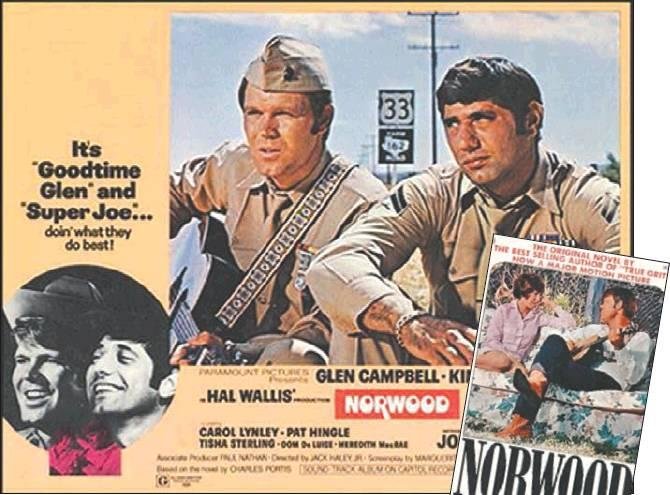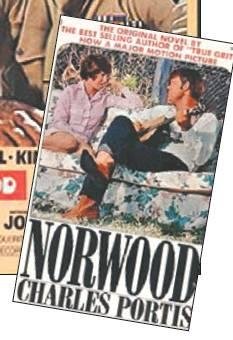A good ol’ boy goes travelin’
Former SC Chief Deputy Attorney General and a retired Judge of the SC Court of Appeals Bert Goolsby recommends “Norwood,” a novel by Charles Portis.
The last time I checked, a new, paperback …
This item is available in full to subscribers.
Subscribe to continue reading. Already a subscriber? Sign in
Get 50% of all subscriptions for a limited time. Subscribe today.
Please log in to continueNeed an account?
|
A good ol’ boy goes travelin’
Former SC Chief Deputy Attorney General and a retired Judge of the SC Court of Appeals Bert Goolsby recommends “Norwood,” a novel by Charles Portis.
The last time I checked, a new, paperback copy of Charles Portis’ novel “Norwood” sold on Amazon for $14.64. It’s a bargain if there ever was one.
Portis also wrote that great American western “True Grit,” an engrossing read by any measure.
What is Norwood about? It’s an adventure tale, set principally in the segregated South during the 1950s against the backdrop of its culture and language.
Like Homer’s Odyssey, the story tells of a journey and the encounters experienced by the story’s protagonist.
Rather than travel by ship or boat, Norwood travels by Trailways bus, the regular kind, not a Vista-Dome.
As the story begins, Nor-wood Pratt, a Korean combat veteran who is neither the brightest nor the dumbest of men (he scored 125 on his service GCT), receives a hardship discharge from the Marine Corps.
After spending time at home in Ralph, Texas, with his sister Vernell and his disabled but philosophic VAsupported brother-in-law Bill Bird, and working in a filling station that featured “dishes and cheap gasoline,” Norwood takes advantage of an all-expense-paid opportunity to go across country to deliver 2 automobiles to New York City. At the same time he collects $70 owed him by Joe William Reese, a fellow Marine and resident of the big city.
Grady Fring the Kredit King, a licensed private investigator, debt collector, and, “among other things,” a seller of “non-cancellable guaranteed renewable for life” policies of hospital insurance, provided Norwood with that opportunity.
A reader need go no further than page 3 of the novel before being hooked.
There, Portis tells of Nor-wood’s encounter on a bus with a couple of asparagus pickers, the Remleys, and their infant son Hershel.
After Norwood compliments the mother on the baby’s good behavior, she spoke for the child by employing the “say” technique most all of us, particularly Southerners, have used for our own infant sons or daughters. For instance, when Norwood asked about the age of the child, Mrs. Remley, speaking for the baby, said, “Say I’m 2 years old.” And when Norwood held up 2 fingers and asked the baby to hold up his 2 fingers, the mother tells Norwood that Herschel could not do that, but that he could “blow out a match.”
Now, that’s funny.
Others he would meet include Edmund B. Ratner, a dwarf once billed as “the World’s Smallest Perfect Man,” and “Joann the Wonder Hen,” a purported college-educated dominique chicken. Nor-wood apparently felt drawn to them because he himself longed to be in show business, singing country music.
As an admirer of Lefty Frizzell, who popularized the song “Always Late –With Your Kisses,” Norwood dreamed of appearing someday on the Louisiana Hayride in Shreveport.
Perhaps most important of his encounters happened on an evening among the tall pines of Virginia when the bus took on a passenger who stood waiting alongside the highway with a flashlight, a shopping bag stuffed with clothes, a dangling electric cord and an overnight case.
The passenger, whom Portis describes as being a “pretty little girl” but “a little thin in the leg,” stumbles onto the bus and sits directly in front of Norwood. The girl, Rita Lee, eventually will sit beside Norwood and a romance will grow.
Will Norwood deliver the automobiles intact? Will he recover his $70? And will anything come of
the on board romance with Rita?
And what about
Joann? What will become of that gifted
“Dominecker,” as Rita
referred to it?
Well, you’ll have to
read the book.
On a personal note, I
owe a lot to having read “Norwood.” It led me to write “Finding Roda Anne” (Publishing by Rebecca Vickery), a story about a fast-talking, Deep-South lawyer, you would not employ on a good day and whomgoes in search of a lost heir.
Bert Goolsby is a graduate of The Citadel and an Army veteran who holds a law degree from the University of South Carolina. He is the author of “Elmore’s Corner” (Amazon Kindle), “The Locusts of Padgett County” (Alondra Press) and “Trials of Lawyer Pratt” (Publishing by Rebecca Vickery).
Other items that may interest you












Comments
No comments on this item Please log in to comment by clicking here